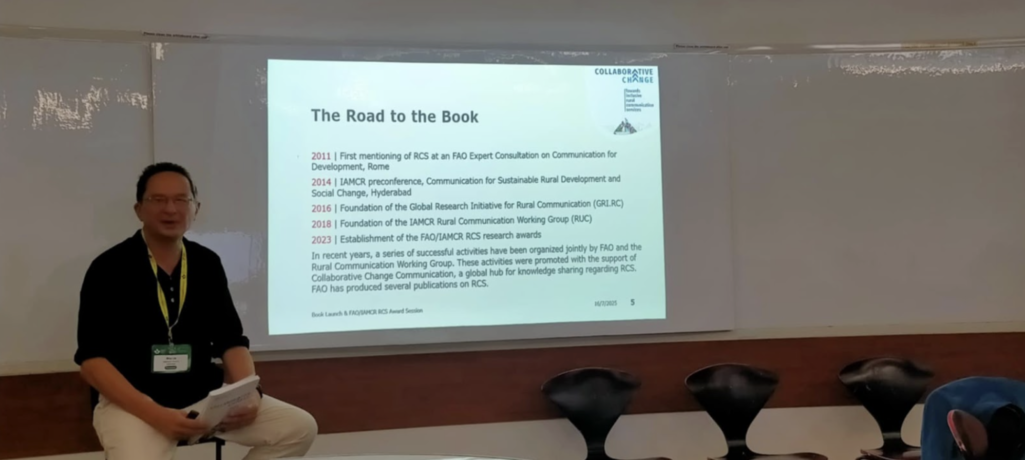A decade-long journey of research, collaboration, and advocacy came to fruition during the IAMCR 2025 Conference in Singapore with the official launch of the book “Collaborative Change: Lessons from the Ground on Rural Communication Services.” Dr. Rico Lie of Wageningen University led the launch, which was held during the special FAO/IAMCR Rural Communication Services (RCS) session of the conference and participated in by ComDev scholars from across the globe.
He traced its roots back to a 2013 FAO expert consultation in Rome where the concept of RCS was first formally discussed. From there, a series of critical events such as the IAMCR preconference in Hyderabad in 2014, the creation of the Global Research Initiative for Rural Communication (GRI.RC) in 2016, and the establishment of the IAMCR Rural Communication Working Group in 2018, laid the groundwork for what would become a collaborative and global undertaking.
The book was shaped by years of dialogue between academics, practitioners, and community workers. It also highlighted how the RCS approach is built on the understanding that theory and practice are not opposing forces but rather interconnected paths toward inclusion, accountability, and social change.
The book tackles three key challenges. First, it dismantles the outdated notion of a divide between theory and practice by emphasizing their intrinsic link, especially in the realm of rural development. Second, it argues for moving beyond the hype of digitalization by promoting inclusive, people-centered communication design. And third, it underscores the importance of enabling environments through infrastructure, capacity-building, and institutional support.
Moreover, it is divided into three sections. The first, “Communication and Collective Action,” focuses on group learning and co-innovation, advocating for participatory models that value diverse perspectives. The second part applies the RCS framework to address social and communication inequalities. Finally, the third section highlights enabling conditions for RCS, showcasing examples from countries such as Argentina, Kenya, and Mexico where locally-managed networks are helping reshape rural communication landscapes.
Two contributing authors, namely Nurdahalia Lairing and Prakash Raj Bista, were recognized during the launch. Lairing, who wrote Chapter 1 titled “Developing Rural Communication Services: Prototype Testing of a Digital Farmer Field School in Indonesia,” shared the importance of grounding innovation in community realities in the book. Her work highlights how digital tools can be co-developed with farmers rather than imposed upon them.
Prakash Raj Bista, author of Chapter 8 “Community Art and Communication: Crafting Sustainable Landscape Stewardship in Terai Arc, Nepal,” shared how participatory art and storytelling have the power to foster deeper stewardship of natural resources. His chapter brings to life the intersection of communication, culture, and conservation.
A global team of experts are credited as editors of the book. This includes Dr. Rico Lie from Wageningen University and Research, Mario Acunzo and Paoloregel Samonte from United Nations Food and Agriculture Organization, Dr. Sarah Cardey from the University of Reading, Dr. Elske van de Fliert from the University of Queensland, Dr. Maria Stella Tirol from the University of the Philippines Los Baños College of Development Communication, and Dr. Loes Witteveen from Van Hall Larenstein University of Applied Sciences, Netherlands.
One of the book’s key messages is the importance of systemic thinking and community engagement. Many successful RCS initiatives described in the chapters were developed through “living lab” models that emphasize co-creation, local leadership, and context-sensitive implementation.
The launch concluded with a call to further institutionalize RCS within communication policies, academic programs, and development strategies. It was emphasized that sustained investment in rural communication infrastructure and local capacities will be key to making inclusive rural development a reality.
The Collaborative Change book is freely accessible to the general public, researchers, practitioners, and policymakers. It can be downloaded at the FAO Knowledge Repository.
Article contributed by Maria Soledad, CCComDev intern.


Comments are closed, but trackbacks and pingbacks are open.